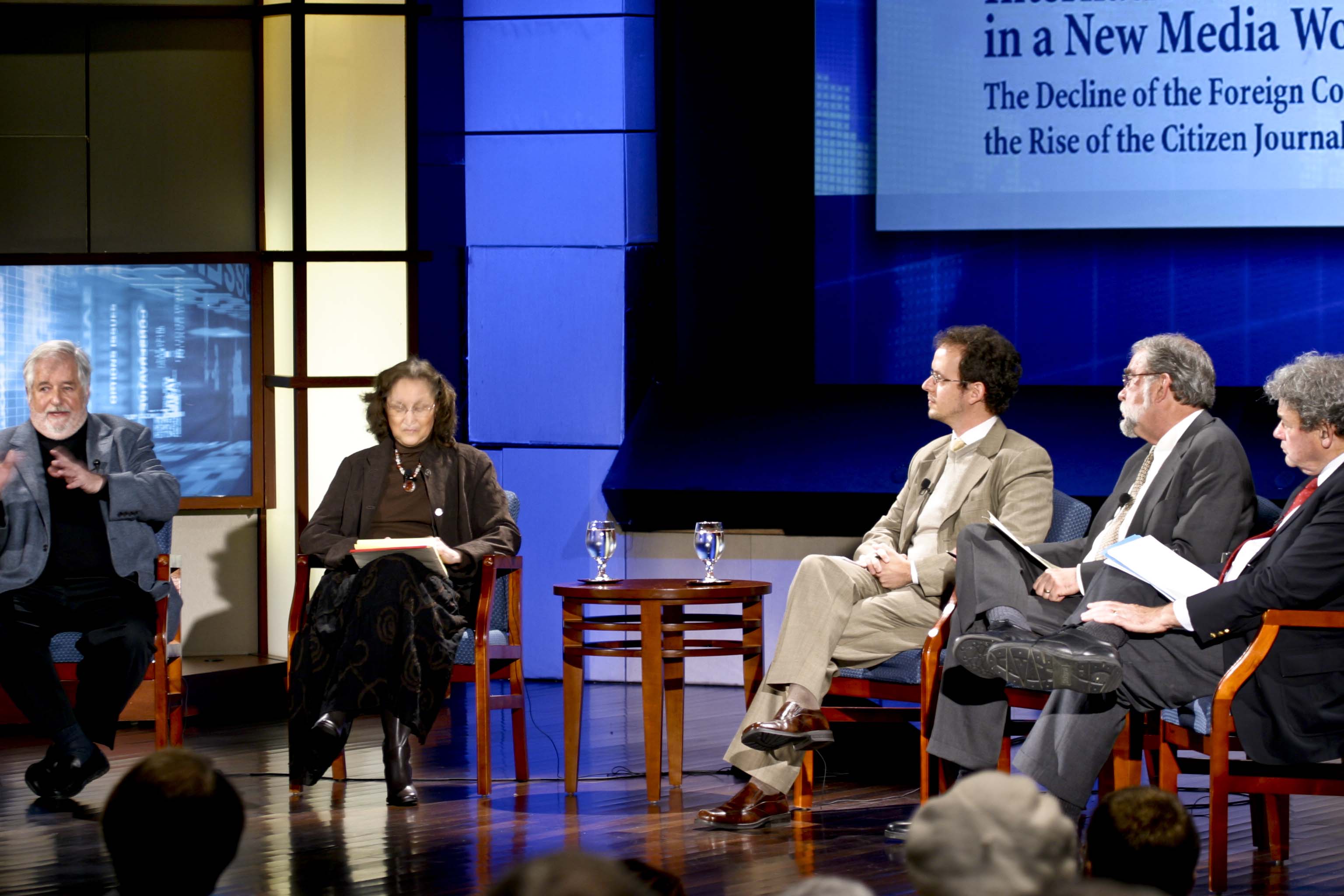Press Release
Panel Discusses Emerging Media Model for International News Coverage
December 10, 2008 | Washington, DC.« Back to Press Releases
 Panelists discuss declining international coverage.
Panelists discuss declining international coverage.
![]() Listen to MP3 audio
Listen to MP3 audio
![]() Watch WinMedia Broadband
Watch WinMedia Broadband
![]() Watch WinMedia Dial-up
Watch WinMedia Dial-up
![]() Watch Real Media Broadband
Watch Real Media Broadband
![]() Watch Real Media Dial-up
Watch Real Media Dial-up
Washington, DC, December 10, 2008 -- As mainstream media retrenches from international news coverage, a new breed of citizen journalist is stepping in to fill parts of the void. Armed with cell phones, text messages, small digital cameras and blogs, citizen journalists can broadcast information from places the mainstream media simply isn't any more.
These new voices present a variety of challenges and opportunities to the free flow of information, many of which were discussed at a Broadcasting Board of Governors (BBG) panel discussion Dec. 10, 2008 held at George Washington University to mark the 60th Anniversary of the UN Declaration on Human Rights.
"Repressive governments have always ignored Article 19," observed D. Jeffrey Hirschberg of the Broadcasting Board of Governors in reference to the right to receive news and information in the UN Declaration. "As long as we can keep finding ways to bring accurate and reliable information to and about those who are in most desperate need, we are preserving the 60-year old hope of the Universal Declaration of Human Rights."
Steve Roberts, longtime journalist and Professor of Media and Public Affairs at George Washington University, moderated the discussion of the consequences of this emerging model including editorial questions of sourcing and verification of content from bloggers, crowd sourcing and the distinction between trained journalists and online activists.
"The role of the mainstream media is even more relevant," said Patrick Meier, a research fellow at the Harvard Humanitarian Initiative, arguing that the traditional media needs to look at all the new streams of information coming in and figure out new ways to use them to enhance its coverage.
Meier, citing the recent terrorist strike in Mumbai, India, pointed out that the Wikipedia entry for the attack was edited some 900 times in the first 21 hours after the event, in what he termed a "self correcting mechanism."
Bob Dietz, the Asia program coordinator at the Committee to Protect Journalists thought that this new trend could create a "surfeit of information" that while hard to sift through, can supply the information, particularly international news, no longer provided by the mainstream media.
Loren Jenkins, the senior foreign editor at National Public Radio, said that NPR, in contrast to other news outlets, is expanding its international coverage because "there is a public that wants international news."
Sherry Ricchiardi, a senior writer at the American Journalism Review and a professor at the Indiana University School of Journalism, said the McClatchy Company, a large newspaper publishing company, was harnessing the voices of some foreign-based bloggers with whom they'd developed a strong, trusting relationship.
![]() For Mr. Hirschberg's entire remarks, click here.
For Mr. Hirschberg's entire remarks, click here.
![]() For Patrick Meier's presentation, click here.
For Patrick Meier's presentation, click here.
![]() For Bob Dietz's presentation, click here.
For Bob Dietz's presentation, click here.
The Broadcasting Board of Governors is an independent federal agency, supervising all U.S. government-supported, non-military international broadcasting, whose mission is to promote freedom and democracy and to enhance understanding through multi-media communication of accurate, objective, and balanced news, information, and other programming about America and the world to audiences overseas. BBG broadcasting organizations include the Voice of America, Radio Free Europe/Radio Liberty, the Middle East Broadcasting Networks (Alhurra TV and Radio Sawa), Radio Free Asia, and the Office of Cuba Broadcasting (Radio and TV Martí). BBG broadcasts reach over 175 million people worldwide on a weekly basis.
For more information, call the Office of Public Affairs at (202) 203-4400, or e-mail publicaffairs@bbg.gov.

